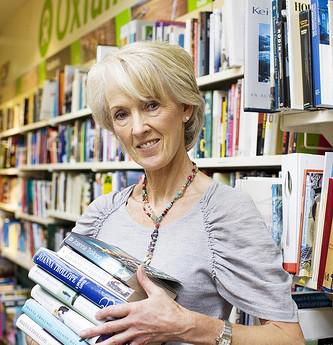
Joanne Trollope. Photo credit: The Spider Hill
The long list of twenty books (out of 143 submitted) in the running for the the £30,000 Orange Prize for Fiction was announced 8 March to coincide with International Women’s Day. The literary award is given to the female author judged best by an all-female panel, which this year comprises Joanna Trollope (chair), Lisa Appignanesi, Victoria Derbyshire, Natalie Haynes and Natasha Kaplinsky. Given male authors aren’t considered for the prize, it has been deemed sexist by some.
The shortlist is due on 17 April and the winner will be announced at an awards ceremony at the Royal Festival Hall on 30 May. Previous bestselling winners (in order of sales) include Andrea Levy’s Small Island, Lionel Shriver’s We Need to Talk About Kevin and Half of a Yellow Sun by Chimamanda Ngozi Adichie.
Novelist Trollope was the only judge to actually read all 143 submissions (the others managed about 35 each). She told The Guardian: “This experience has been … exhilarating because three of the judges are younger than my own children, which has brought a wonderful kind of freshness and energy not just to the meetings, but to me.”
A diverse offering. Well-known authors such as Ali Smith, Anne Enright, A. L. Kennedy, Emma Donoghue (shortlisted last year for The Room) and Esi Edugyan, who was shortlisted for the 2011 Man Booker Prize, rub shoulders with five debutantes and four second-novel writers. The oldest of them (and the oldest ever nominee by at least 10 years) is New Yorker Cynthia Ozick, 83, who has been nominated for Foreign Bodies. Also in the running is former City trader Aifric Campbell, nominated for On The Floor, a semi-autobiographical piece inspired by her 13 years at Morgan Stanley, which ended when she suffered a breakdown trying to juggle her career and motherhood.
Have a virtual browse at The Guardian’s online gallery, which has all the book covers and synopses.
Who’s going to win? Critics and pundits are keeping their cards close to their chests at this early stage. As Robert McCrum of The Guardian said “The shortlist is, of course, the list that counts.” That said, he suggested that Esi Edugyan’s Booker-shortlisted Half Blood Blues “must be in with a chance.”
Historical themes. Mark Brown in The Guardian commented on the large number of historical novels, set in locations as varied as Ancient Greece (Classics tutor Madeline Miller’s The Song of Achilles) and Paris under the Nazis (Half-Blood Blues by Esi Edugyan).
A sexist prize? In 2010, A.S. Byatt criticised the prize at the Edinburgh Book festival, saying: “The Orange prize is a sexist prize … You couldn’t found a prize for male writers. The Orange prize assumes there is a feminine subject matter – which I don’t believe in. It’s honourable to believe that – there are fine critics and writers who do – but I don’t.” Fanning the flmaes of this “perennial hoo-ha” while admitting to having read “precisely nothing” on the list, Anna Baddeley in The Spectator suggested that this question is of little consequence beyond the confines of the Guardian comment boards and argued that Orange should put some men on the judging panel in order to combat prejudice from male readers. This question, which has clearly been raised before, is dismissed by the Orange Prize website’s FAQ section, which explains that “the founders wanted to celebrate women’s critical views as well as their writing” and have in fact run parallel mixed and youth panels in the past.
According to analysis of Nielsen BookScan sales figures published in The Bookseller, the bestselling Orange Prize winners have outsold the bestselling winners of the Booker prize.
Let’s celebrate women writers. Foyles’s blogger Emily Best suggested that we go back to the root of the problem and and take inspiration from the travails of women writers from 100 years ago who had much more opposition to face in their chosen profession, as chronicled in Daughters of Decadence: Women Writers of the Fin-De-Siecle, an anthology by Elaine Showalter.

